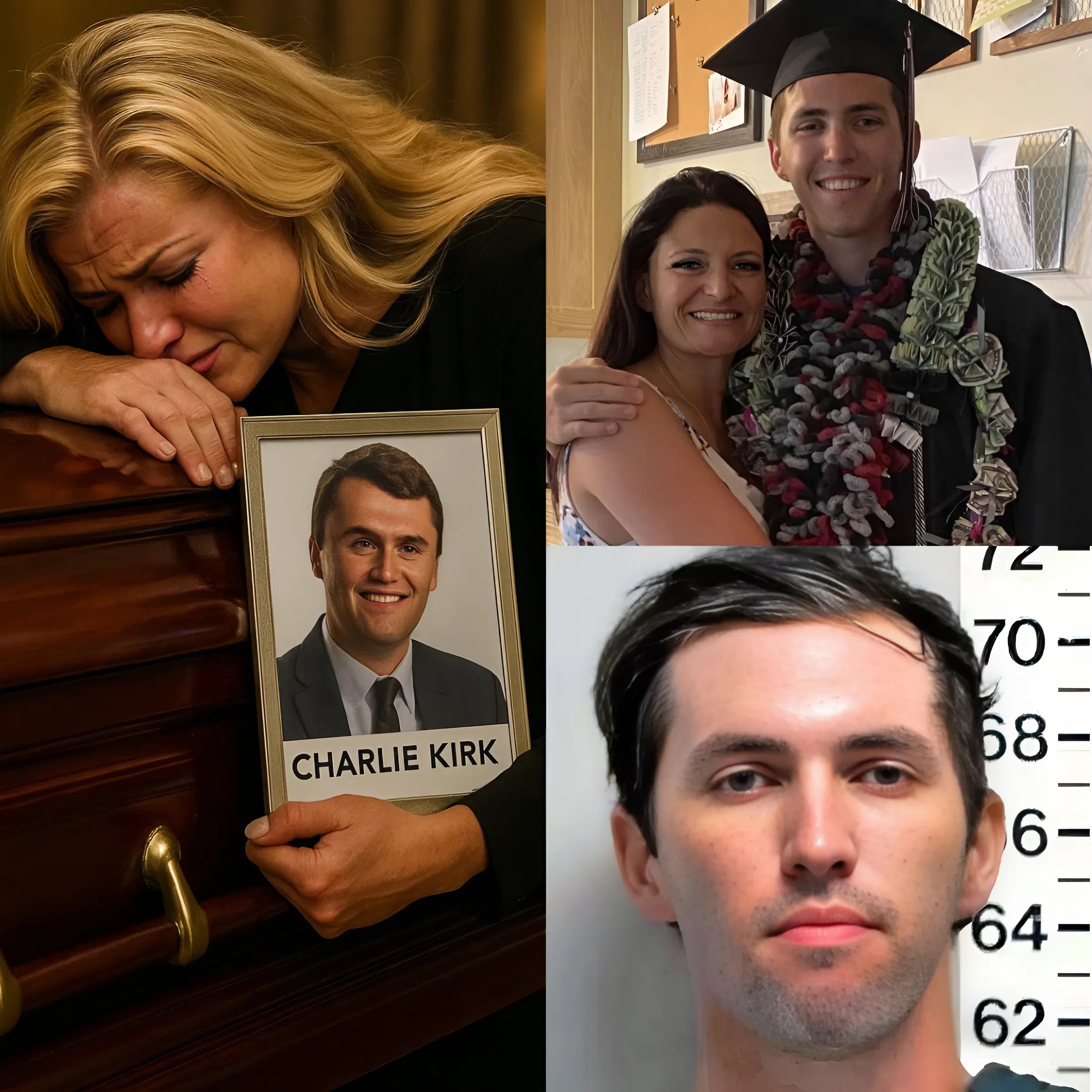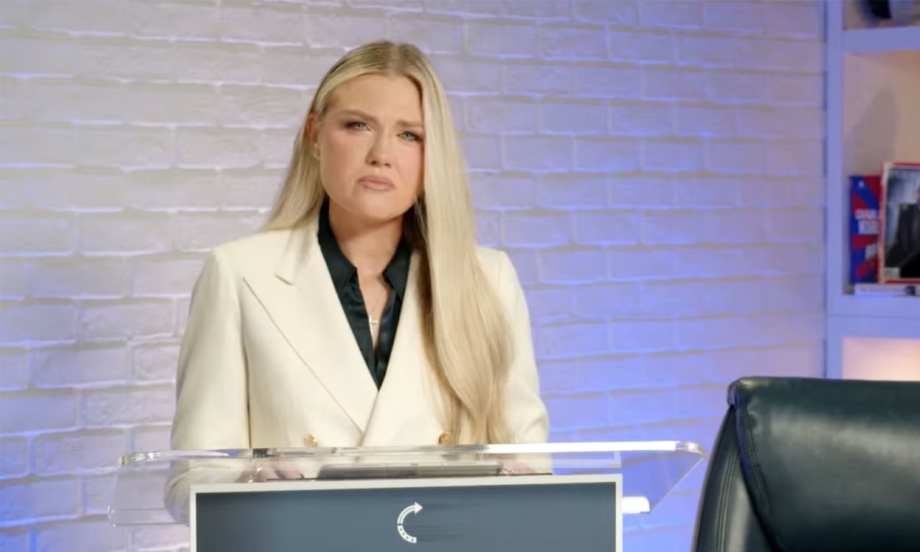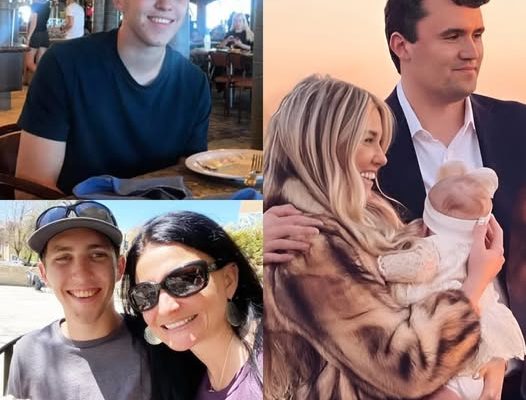Home Uncategorized SHOCKING FAMILY TRAGEDY: “She Was His Mother, She Gave Him Love, Faith, and Every Chance to Succeed — Until One Night, His Whispered Words Turned Her Home Into a Crime Scene” — Amber Robinson’s Heart-Wrenching Account of the Moment Her Son Tyler Revealed a Dark Secret That Shattered Their Family, Left a Nation Questioning How a Mother Could Miss the Signs, and Hinting at a Chilling Truth Still Lurking Behind Closed Doors…
A Mother’s Devotion Tested to Its Limits
Amber Robinson’s life, like that of countless devoted parents, had been defined by her unwavering dedication to her son, Tyler. From the moment he was born, she poured her heart into raising him with faith, love, and guidance. Friends and family often remarked on the close bond they shared—Tyler, a seemingly bright and compassionate young man, and Amber, a mother whose attention to his growth and wellbeing seemed absolute.
Yet, in a moment that has since left her world irrevocably changed, that devotion was tested beyond measure. In a hushed, trembling voice, Tyler revealed a secret one evening—a truth so shocking that it turned Amber’s home, her sanctuary, into a crime scene. Amber recounts the moment with a mixture of heartbreak and disbelief: “I thought I knew my son better than anyone. I thought I had taught him right from wrong. But that night, I realized how little I had seen.”
This revelation has captivated a nation, sparking conversations about the limits of parental awareness, the hidden struggles of young people, and the societal pressures that can mask underlying turmoil.

The Illusion of Normalcy
The Robinson family had, for years, embodied what many would consider the ideal household. Tyler excelled academically, engaged in extracurricular activities, and maintained relationships that outwardly appeared healthy and stable. Amber, meticulous in her guidance, celebrated each milestone and achievement, always encouraging him to pursue his dreams and remain steadfast in his values.
Yet appearances, as Amber painfully discovered, can be deceiving. Tyler’s whispered confession unveiled a side of him that had been hidden from even the most watchful parent. While outwardly well-adjusted, he had been grappling with private struggles that, tragically, had gone unnoticed until the pivotal night that changed everything.
Experts in child psychology note that this phenomenon is more common than many parents realize. Adolescents often conceal inner turmoil, masking behaviors and emotions behind a facade of normalcy. The Robinsons’ tragedy underscores the stark reality that love and attentiveness, though essential, are not always sufficient to uncover what remains unspoken and unseen.
The Night That Shattered Everything
Amber recalls the night with harrowing clarity. Tyler, speaking in a whisper, shared the secret he had been carrying—an admission that transformed the safe and familiar environment of their home into a scene of fear, confusion, and grief.
“The words were so soft, so quiet,” Amber remembers, “and yet they cut through everything I thought I knew. My home felt like it had been invaded by a shadow I could not have imagined.”
The immediate aftermath was chaotic. Law enforcement was summoned, neighbors whispered in concern, and the media soon descended, turning a private family crisis into a matter of national attention. For Amber, the most pressing and personal question remained: how could she have missed the signs, despite her constant vigilance and unwavering support?

The Complexity of Hidden Struggles
Psychologists emphasize that adolescents often develop coping mechanisms that conceal their emotional and behavioral challenges. Dr. Elaine Harper, a child and adolescent psychologist, explains: “Children can present as high-functioning and well-adjusted while simultaneously grappling with significant internal conflicts or impulses. Parents may observe only the outward behaviors, unaware of the internal struggles that remain invisible until they escalate.”
Tyler’s case starkly illustrates this complexity. His outward achievements and demeanor masked a private reality that would ultimately culminate in a catastrophic revelation. For parents and society, this underscores the sobering fact that even the most attentive guardians may be unaware of the hidden crises their children face.
The National Reaction
The Robinson family tragedy has sparked widespread public discourse. On social media platforms, hashtags related to Tyler and Amber’s story have trended, generating conversations about parenting, mental health, and societal responsibility. Many express sympathy for Amber, acknowledging the impossibility of foreseeing every hidden struggle. Others use the case to highlight broader systemic issues, such as gaps in mental health support, societal pressures on youth, and the stigma that often prevents young people from seeking help.
This tragic incident has become a catalyst for national reflection, forcing communities to confront the uncomfortable truth that appearances can be deceiving, and that children’s internal experiences are not always accessible—even to those who love them most.

Amber Robinson’s Advocacy and Message
Despite the personal devastation, Amber has chosen to speak publicly about her experience. Her aim is not to seek attention but to educate, warn, and provide guidance to other families. She emphasizes the need for vigilance, open communication, and early intervention.
“I want parents to know that it’s not a failure to miss the signs,” Amber states. “But it is a call to action to be proactive, to talk openly with our children, and to create spaces where they feel safe revealing what they’re struggling with.”
Amber’s advocacy highlights an urgent societal need: ensuring that parents, schools, and communities are equipped to recognize potential warning signs and provide meaningful support before crises escalate.
The Psychological and Social Dimensions
Experts stress that cases like Tyler’s reveal broader challenges in adolescent development. Teens and young adults often navigate complex pressures—academic, social, and emotional—that can contribute to concealed distress. The combination of internalized fear, guilt, and shame can prevent them from seeking help, even when parents are attentive and caring.
Amber Robinson’s story is instructive in showing that hidden struggles do not discriminate based on parental involvement, love, or guidance. The tragedy reflects the intricate, often opaque, inner lives of young people and the need for society to develop systemic mechanisms to detect and respond to distress before it escalates into irreversible outcomes.
The Lingering Questions
Even as details of Tyler’s secret continue to emerge through law enforcement and investigative reporting, one question resonates profoundly: how can families better understand the hidden realities of their children’s lives?
Amber’s story forces society to confront the limits of observation, the pressures that young people face, and the gaps in support structures that might otherwise prevent crises. The chilling implication is that tragedy can occur even in homes filled with love and care, underscoring the fragility of safety and the importance of vigilance and proactive engagement.
Lessons for Families and Society
The Robinson tragedy serves as a stark reminder of the need for heightened awareness, dialogue, and support. Experts recommend several key strategies:
-
Open Communication: Encouraging children to speak honestly about their feelings and struggles.
-
Mental Health Resources: Ensuring accessible counseling and support within schools and communities.
-
Observation Without Judgment: Recognizing behavioral changes without assuming they are temporary or inconsequential.
-
Community Engagement: Fostering networks of support beyond the immediate family.
Amber Robinson’s willingness to share her experience illuminates these lessons, turning personal tragedy into a public guidepost for families nationwide.
Reflection: Love, Loss, and the Limits of Awareness
Amber’s narrative is deeply human. It is the story of love tested by incomprehensible events, of faith confronted with uncertainty, and of a parent grappling with the limitations of perception.

“I gave him every chance to succeed,” Amber reflects. “I gave him my love, my guidance, my faith. Yet some things are invisible until they emerge. Our story is painful, but if it helps another parent, another child, another family, then perhaps some good can emerge from our heartbreak.”
This reflection resonates far beyond the Robinson household. It speaks to the universal challenges of parenting, the hidden complexities of youth, and the moral imperative for society to support, rather than judge, families navigating unseen struggles.
Conclusion: A National Lesson in Vigilance and Empathy
The Robinson family’s story is a haunting reminder that love and attention, while essential, may not prevent tragedy. Amber Robinson’s account reveals the delicate, complex, and often hidden dynamics of family life and adolescent development, and it challenges society to consider how it can better equip parents and communities to recognize and address hidden distress.
Her courage in sharing this story transforms personal grief into a lesson for a nation grappling with the intersection of family, psychology, and societal responsibility. The tragic revelations surrounding Tyler’s secret serve as both a warning and a call to action: vigilance, empathy, and proactive engagement are crucial to protecting children, supporting families, and preventing the unseen from manifesting in devastating ways.
Amber Robinson’s voice reminds us that even in tragedy, awareness, advocacy, and understanding can emerge as guiding lights—helping families navigate the unpredictable, often hidden challenges that shape the lives of children and teens across America.




